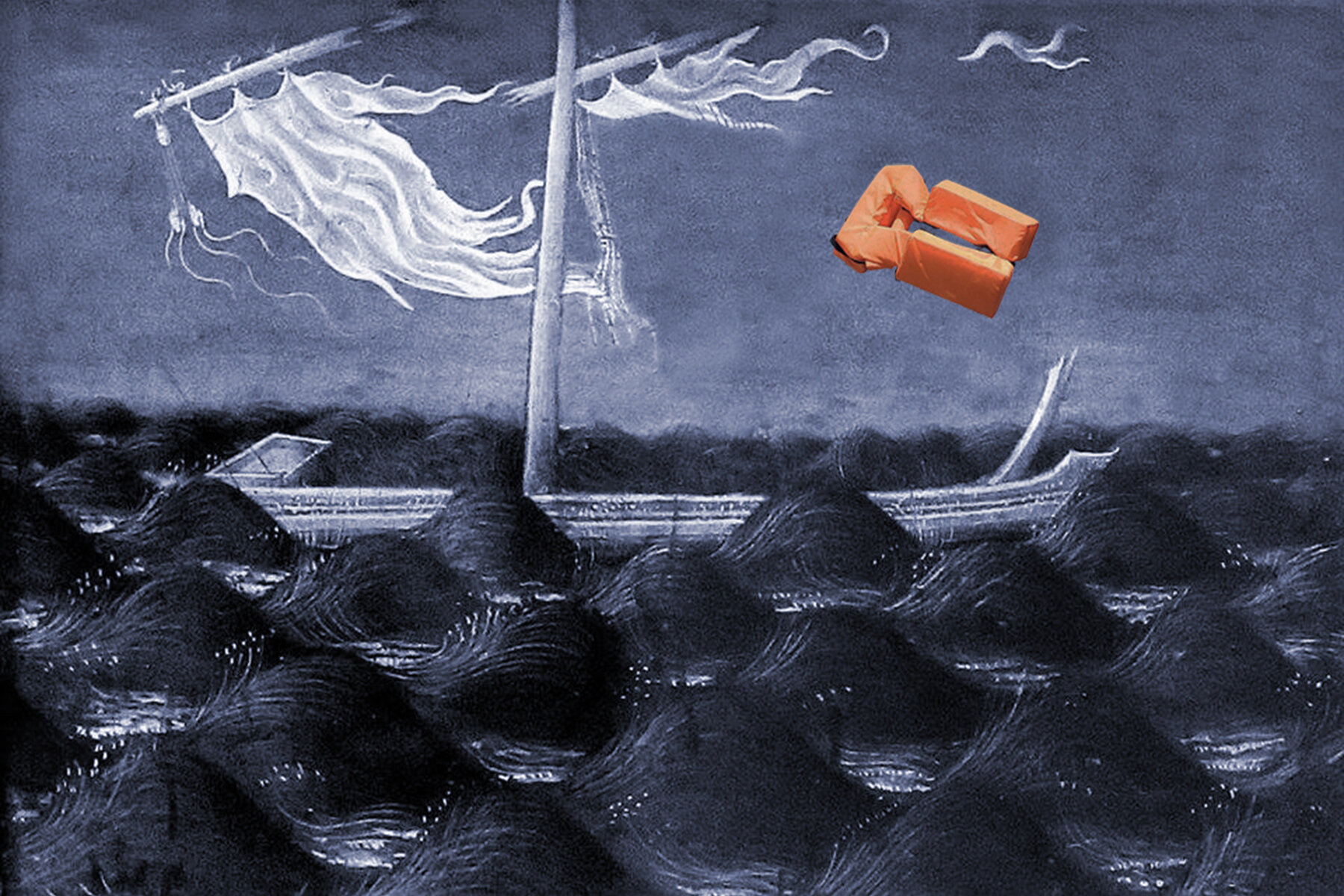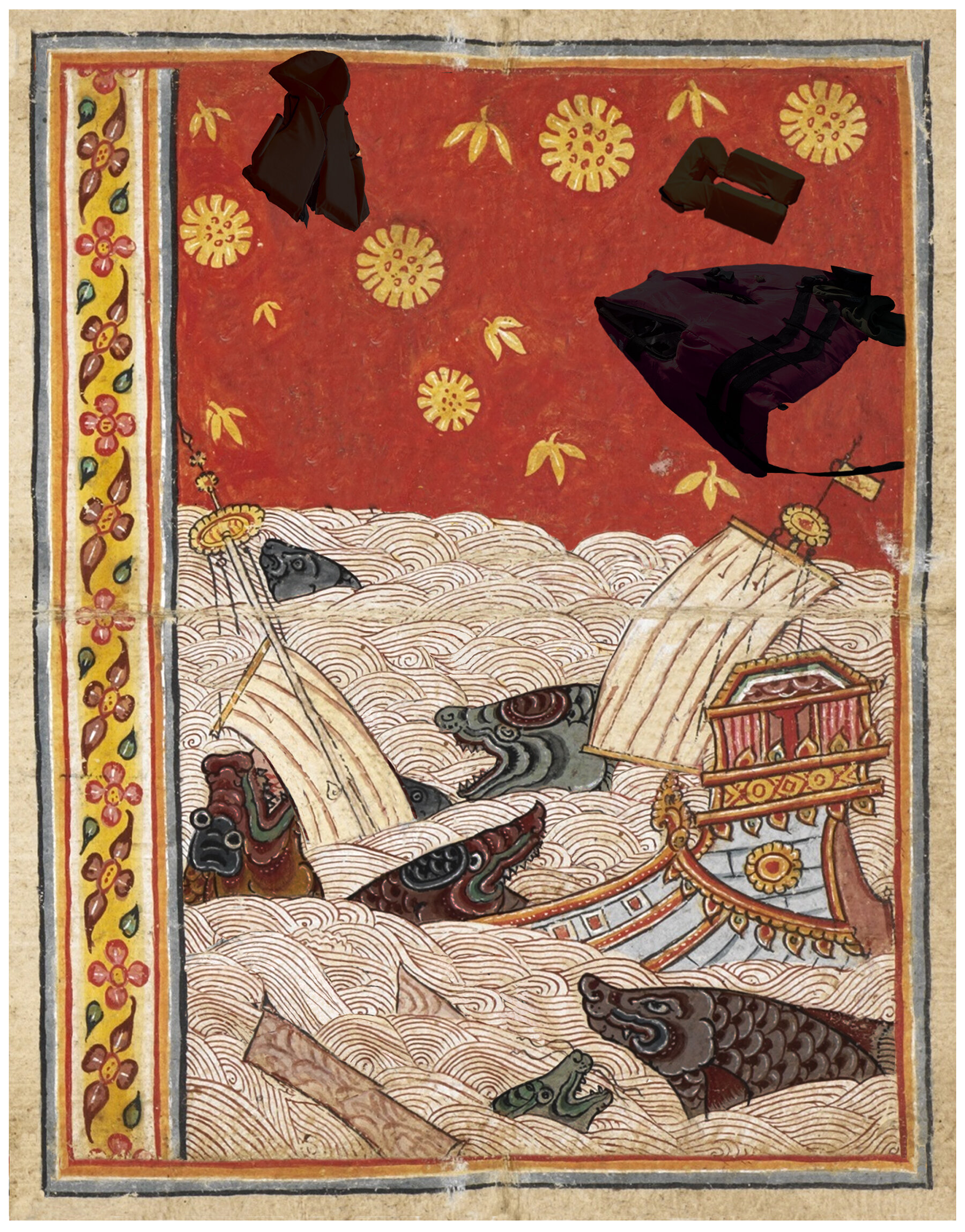Ghost Ships
The news in those days was full of war and migrants and nativists, and it was full of fracturing too, of regions pulling away from nations, and cities pulling away from hinterlands, and it seemed that as everyone was coming together everyone was also moving apart. Without borders nations appeared to be becoming somewhat illusory, and people were questioning what role they had to play.
—Mohsin Hamid, Exit West
Though the refugee crisis today is dire, their plight is not a new phenomenon. Across time, the making of states, and their failures, have prompted the besieged and persecuted to flee — to neighboring states, across many waters of the world.
Ghost Ships focuses on sea vessels that bear the desperate. The source imagery is derived from fables, myths, and stories of peril and survival — from western and eastern cultures across centuries. The arks and boats are either intact or wrecked, but always emptied of humanity. Modern instruments of rescue — life jackets — either fill their decks, float around the wreckage, or scatter to the winds. Occasionally, ravens or doves carry them in their beaks, arriving too late or withholding aid.
While there is much generosity offered to those crossing borders, there is also much resistance. There is a gulf between those who are secure and those who are not. Refugee boats are caught up in maelstroms of both nature and politics. Once afloat, their passengers must withstand the elements; but before, during and after their voyage, they face human obstacles as well — the crimes of unscrupulous smugglers and the underworlds of societies that prey upon the undocumented. Unseaworthy vessels are filled beyond capacity. Refugees have been fired upon from at shore and at sea. Far right movements in Europe promote the preservation of national identity and a return to 'traditional western values'. Anti-immigrant groups and governments have vowed to stop the ‘invasion’ of refugees attempting to sail to Europe, by disrupting rescue missions or physically blocking boats loaded with North African migrants. They accuse non-governmental organizations of colluding with traffickers to bring unwelcome migrants that they characterize as ‘enemies of Europe.’
American counterparts also promote a white ethnostate. Such movements here and abroad demand stronger borders and more barriers; they are willing to thwart — even prosecute — life-saving efforts, rescues at sea or water provisions in the desert, in order to advance a xenophobic agenda. Meanwhile, over the last two decades, there have been 34,361 deaths recorded of migrants traveling to Europe at sea, as well as in detention blocks, asylum units, factories and town centers and 7,000 border deaths recorded in the U.S.A. (1,2)
Many people in countries that attract the highest number of immigrants believe that they strengthen their nations. Still, citizens remain divided over how many to accept, criteria for entry, and policies to be enforced. A considerable number oppose admitting undocumented refugees or migrants fleeing from war, crime, poverty or oppression. Ghost Ships exposes the consequences of this opposition, whether arising from indifference, resentment, or fear of ‘the stranger.’ The consequence is the denial of safe and humane harbor, on land or at sea.
1 https://www.theguardian.com/world/2018/jun/20/the-list-europe-migrant-bodycount
2 https://www.nytimes.com/2019/06/11/us/scott-warren-arizona-deaths.html
Ghost Ship, 2017
Archival digital print on Hahnemuhle paper; 4 x 6 inches image size; 14.25 x 15.25 inches paper size
Source: Giovanni di Paolo, St. Clare Rescuing the Shipwrecked, ca. 1455
a cross nailed from the ribs of your sunk ships,
paper prayer scraps, one million calls
to the wrong God.
Eliza Griswold, from Lampedusa II in Everyone is an Immigrant from Poetry Magazine, January 3, 2012
Ark I, 2017
Archival digital print on Hahnemuhle paper; 24 x 18 inches paper size; 25.25 x 19.25 inches framed.
Source: Noah's Ark. Psalterius [psautier latin dit de saint Louis et de Blanche de Castille], c. XIII
century, Ms-1186 réserve, f. 13v, Bibliothèque de l'Arsenal
The mothers will ask us
About the sea
… We shall tell them about the sea
How it threw us to our death
So we ploughed through Europe’s fields
In order to flip the dice of life
We shall tell how we crossed the Aegean Sea
And were lost like Ulysses
How we travelled the sea to a jungle in France
And the rescuers surrounded us with barbed wire and presents
Husam Eddin Mohammad, from Andalucia of the Trains
Syrian poet based in London, recited at Calais Refugee Camp, October 2015
Windblown, 2017
Archival Digital print on Hahnemuhle paper; 24 x 18 inches paper size; 7.75 x 6 inches image size;
25.25 x 19.25 inches framed.
Source: Mahajanaka’s rescue, Thai manuscript 18th c, British Library, Or.14068, f. 3
Somewhere I am a meal of the sea.
Ali Johar, from I Am Rohingya
Black Ark, 2017
Archival digital print on Hahnemuhle paper; 25.25 x 19.25 inches framed. Source: Miniature from
Hafiz-i Abru's Majma al-tawarikh. Noah's Ark Iran (Afghanistan), Heart
The dinghy sank and my heart, hot for Europe, went cold
Yasser Niksada
Afghan poet living in Germany, written at age 15
Ark II, 2017
Archival digital print on Hahnemuhle paper; 24 x 18 inches paper size; 25.25 x 19.25 inches framed.
Source: Noah's Ark. Psalterius [psautier latin dit de saint Louis et de Blanche de Castille], c. XIII century, Ms-1186 réserve, f. 13v, Bibliothèque de l'Arsenal
Dark Ark, 2017
Archival digital print on Hahnemuhle paper; 10 x 6.5 inches image size; 25.25 x 19.25 inches framed.
Source: Noah's Ark, Anonymous, 15th century
No one leaves home unless home is the mouth of a shark
From Home by Warsan Shire
Home
no one leaves home unless
home is the mouth of a shark
you only run for the border
when you see the whole city running as well
your neighbors running faster than you
breath bloody in their throats
the boy you went to school with
who kissed you dizzy behind the old tin factory
is holding a gun bigger than his body
you only leave home
when home won’t let you stay.
no one leaves home unless home chases you
fire under feet
hot blood in your belly
it’s not something you ever thought of doing
until the blade burnt threats into
your neck
and even then you carried the anthem under
your breath
only tearing up your passport in an airport toilet
sobbing as each mouthful of paper
made it clear that you wouldn’t be going back.
you have to understand,
that no one puts their children in a boat
unless the water is safer than the land
no one burns their palms
under trains
beneath carriages
no one spends days and nights in the stomach of a truck
feeding on newspaper unless the miles travelled
means something more than journey.
no one crawls under fences
no one wants to be beaten
pitied
no one chooses refugee camps
or strip searches where your
body is left aching
or prison,
because prison is safer
than a city of fire
and one prison guard
in the night
is better than a truckload
of men who look like your father
no one could take it
no one could stomach it
no one skin would be tough enough
the
go home blacks
refugees
dirty immigrants
asylum seekers
sucking our country dry
niggers with their hands out
they smell strange
savage
messed up their country and now they want
to mess ours up
how do the words
the dirty looks
roll off your backs
maybe because the blow is softer
than a limb torn off
or the words are more tender
than fourteen men between
your legs
or the insults are easier
to swallow
than rubble
than bone
than your child body
in pieces.
i want to go home,
but home is the mouth of a shark
home is the barrel of the gun
and no one would leave home
unless home chased you to the shore
unless home told you
to quicken your legs
leave your clothes behind
crawl through the desert
wade through the oceans
drown
save
be hunger
beg
forget pride
your survival is more important
no one leaves home until home is a sweaty voice in your ear
saying-
leave,
run away from me now
i don't know what i’ve become
but i know that anywhere
is safer than here
Susanne Slavick is an artist, curator, and professor of art at Carnegie Mellon University. Her work often explores historical and social issues such as, but not limited to, the impact of guns in our culture and the aftermath of war. Slavick has recently exhibited at the Chicago Cultural Center, McDonough Museum in Youngstown, Accola Griefen Gallery in New York, the Bernstein Gallery at Princeton University and Ruffin Gallery at University of Virginia. Her most recent curatorial projects include When the Bough Breaks and Marx@200. The latter was co-curated with Kathy M. Newman and featured 40 contemporary artists addressing Marx's critique of capitalism.







